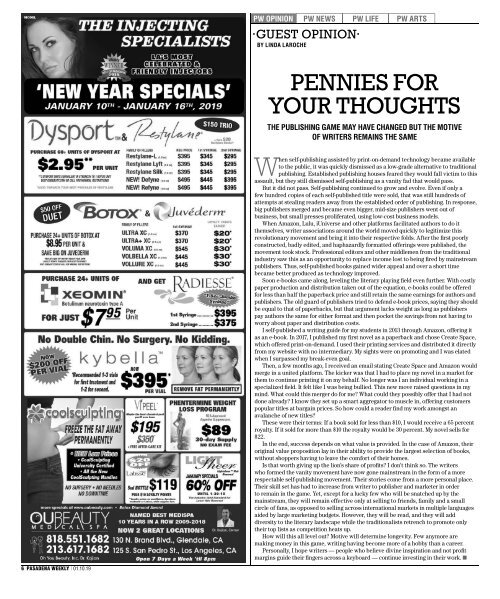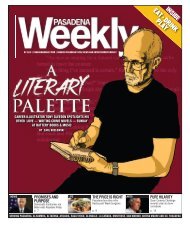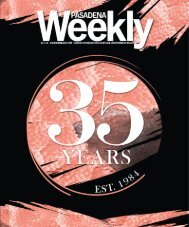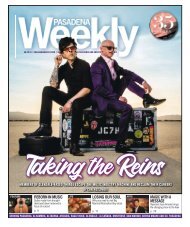01.10.19
Create successful ePaper yourself
Turn your PDF publications into a flip-book with our unique Google optimized e-Paper software.
PW OPINION PW NEWS PW LIFE PW ARTS<br />
•GUEST OPINION•<br />
BY LINDA LAROCHE<br />
PENNIES FOR<br />
YOUR THOUGHTS<br />
THE PUBLISHING GAME MAY HAVE CHANGED BUT THE MOTIVE<br />
OF WRITERS REMAINS THE SAME<br />
When self-publishing assisted by print-on-demand technology became available<br />
to the public, it was quickly dismissed as a low-grade alternative to traditional<br />
publishing. Established publishing houses feared they would fall victim to this<br />
assault, but they still dismissed self-publishing as a vanity fad that would pass.<br />
But it did not pass. Self-publishing continued to grow and evolve. Even if only a<br />
few hundred copies of each self-published title were sold, that was still hundreds of<br />
attempts at stealing readers away from the established order of publishing. In response,<br />
big publishers merged and became even bigger, mid-size publishers went out of<br />
business, but small presses proliferated, using low-cost business models.<br />
When Amazon, Lulu, iUniverse and other platforms facilitated authors to do it<br />
themselves, writer associations around the world moved quickly to legitimize this<br />
revolutionary movement and bring it into their respective folds. After the first poorly<br />
constructed, badly edited, and haphazardly formatted offerings were published, the<br />
movement took stock. Professional editors and other middlemen from the traditional<br />
industry saw this as an opportunity to replace income lost to being fired by mainstream<br />
publishers. Thus, self-published books gained wider appeal and over a short time<br />
became better produced as technology improved.<br />
Soon e-books came along, leveling the literary playing field even further. With costly<br />
paper production and distribution taken out of the equation, e-books could be offered<br />
for less than half the paperback price and still retain the same earnings for authors and<br />
publishers. The old guard of publishers tried to defend e-book prices, saying they should<br />
be equal to that of paperbacks, but that argument lacks weight as long as publishers<br />
pay authors the same for either format and then pocket the savings from not having to<br />
worry about paper and distribution costs.<br />
I self-published a writing guide for my students in 2013 through Amazon, offering it<br />
as an e-book. In 2017, I published my first novel as a paperback and chose Create Space,<br />
which offered print-on-demand. I used their printing services and distributed it directly<br />
from my website with no intermediary. My sights were on promoting and I was elated<br />
when I surpassed my break-even goal.<br />
Then, a few months ago, I received an email stating Create Space and Amazon would<br />
merge in a united platform. The kicker was that I had to place my novel in a market for<br />
them to continue printing it on my behalf. No longer was I an individual working in a<br />
specialized field. It felt like I was being bullied. This new move raised questions in my<br />
mind. What could this merger do for me? What could they possibly offer that I had not<br />
done already? I know they set up a smart aggregator to muscle in, offering customers<br />
popular titles at bargain prices. So how could a reader find my work amongst an<br />
avalanche of new titles?<br />
These were their terms: If a book sold for less than $10, I would receive a 65 percent<br />
royalty. If it sold for more than $10 the royalty would be 30 percent. My novel sells for<br />
$22.<br />
In the end, success depends on what value is provided. In the case of Amazon, their<br />
original value proposition lay in their ability to provide the largest selection of books,<br />
without shoppers having to leave the comfort of their homes.<br />
Is that worth giving up the lion’s share of profits? I don’t think so. The writers<br />
who formed the vanity movement have now gone mainstream in the form of a more<br />
respectable self-publishing movement. Their stories come from a more personal place.<br />
Their skill set has had to increase from writer to publisher and marketer in order<br />
to remain in the game. Yet, except for a lucky few who will be snatched up by the<br />
mainstream, they will remain effective only at selling to friends, family and a small<br />
circle of fans, as opposed to selling across international markets in multiple languages<br />
aided by large marketing budgets. However, they will be read, and they will add<br />
diversity to the literary landscape while the traditionalists retrench to promote only<br />
their top lists as competition heats up.<br />
How will this all level out? Motive will determine longevity. Few anymore are<br />
making money in this game, writing having become more of a hobby than a career.<br />
Personally, I hope writers — people who believe divine inspiration and not profit<br />
margins guide their fingers across a keyboard — continue investing in their work. ■<br />
6 PASADENA WEEKLY | <strong>01.10.19</strong>

















